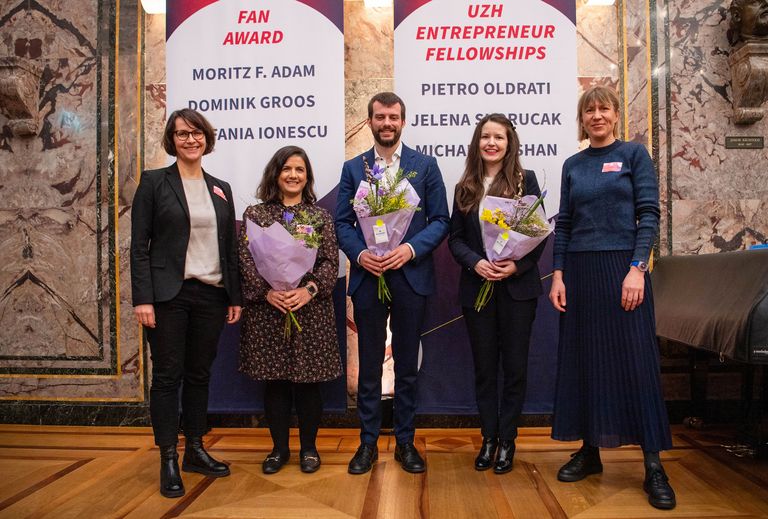How does the University of Zurich attract young researchers and how are research projects prioritized? Find out what makes UZH a unique research institution in our interview with Elisabeth Stark.
Elisabeth Stark began her successful academic career in Germany, became a full professor at the Free University of Berlin and was appointed Professor of Romance Linguistics at the University of Zurich (UZH) in 2008. In 2021, she took over as Vice-President for Research and has been responsible for promoting research, innovation and young talent ever since. Find out in the interview what makes UZH a unique research institution.
Interview: David Iselin
How important is research at UZH?
It is, of course, very important. An integral part of our mission statement is: UZH is a research university. It enables, promotes and expects its members to conduct research. We are also a member of LERU (League of European Research Universities). Research, the promotion of young talent, and innovation are key functions at UZH, as is research-based teaching in line with the Humboldtian ideal
What are UZH’s strengths in an international context?
UZH is very visible with its research. For example, we are a leader in precision oncology, psychological research on healthy aging, structural biology, remote sensing, astrophysics and particle physics, linguistics and behavioral economics. In addition, our Faculty of Veterinary Medicine, Vetsuisse, is ranked 4th in the world, which makes me particularly pleased and proud.
How does UZH attract young researchers?
Here, we have renowned researchers who draw talent to UZH. Since the beginning of 2024, we have also created new, improved conditions for doctoral students, who are guaranteed more “protected research time”, i. e. time that can be used explicitly and exclusively for their own research. In addition, since 2023 we have improved tools for the planning of UZH academic careers. With the “Lecturer Model”, for example, which represents a permanent research position classified under a professorship, researchers with a doctorate receive a higher salary. This provides additional security for researchers in their personal lives or when planning their families. This is highly appreciated in Zurich, where the cost of living is comparatively high.
Which research trends will be pursued more closely at UZH in the future?
Due to demographic changes, geriatric medicine will play an increasingly important role in the coming years. Precision medicine, driven by technological achievements, will continue to gain momentum. Sustainability can also not be ignored, especially biodiversity, which shapes the quality of our living spaces. The importance of researching language, as the most important evolutionary innovation of the human species, will increase, as will digitalization, which is already omnipresent in our everyday lives.
Research is resource-intensive. How do you set priorities?
The prioritization of specific research projects and topics is determined in discussion with the university management, often supported by external expert opinions. The schools develop their own strategies, which are then coordinated appropriately in discussions with the university management. The general rule is: research is competitive, university research is no amateur sport, rather it is the Olympics. Promoting top performance requires setting priorities; at the same time, however, we always keep our performance mandate in mind.
Researchers are dependent on funding. How can they finance their research?
There are both internal and external public funding opportunities, as well as private third-party funding acquired via the UZH Foundation. Every researcher is free to apply through the appropriate sources of funding. The Research Funding Department’s Grants Office, under my own Vice President’s Office, provides advice and support. There are researchers with particularly cost-intensive research who may draw on all three sources of funding. Thanks to donations, the UZH Foundation closes important funding gaps in research projects.
What importance do you attach to private third-party funding?
The role of private support in research funding is becoming increasingly important. The work of the UZH Foundation as a foundation of the University of Zurich is central to this - because some of these gaps are systematic; for example, expensive infrastructures are currently under particular pressure, even though they are a prerequisite for cutting-edge research and the medical care of tomorrow. In some cases, however, there are also special subjects that are close to the hearts of donors and which otherwise would have fewer opportunities with public funding bodies. The UZH Foundation is an ideal match between researchers and committed individuals, foundations, organizations and companies. It brings together people who want to make a difference and achieve something important.
What challenges do you see in terms of promoting young talent?
Competition from the private sector is fierce. Researchers in the fields of artificial intelligence and large language models, for example, are in high demand on the job market. I see the post doc phase as a further challenge. These temporary positions often occur during a time of life when researchers are appropriately, and there is a great deal of uncertainty about the future. This means that some talented people opt for a safe harbor outside academia - especially young female talent. Nevertheless, UZH is and remains very attractive. At UZH, researchers are greatly appreciated and can make their own ideas soar. Some of our researchers have had particular success.
What advice would you give to a promising research talent?
I would say: you have to keep at it, keep at it - and never give up! The effort is worth it, because you get to do the best job there is. As a researcher at a university, you enjoy freedoms that are rarely found in other professions. It’s meaningful work because you can make a difference and have a positive impact on the lives of many people.
Professor Stark, thank you very much for the interview!



![[Translate to English:] Portraitaufnahme von Jonas Birk.](/fileadmin/_processed_/c/7/csm_Jonas_Birk_Interview_7efc87a5cb.jpg)